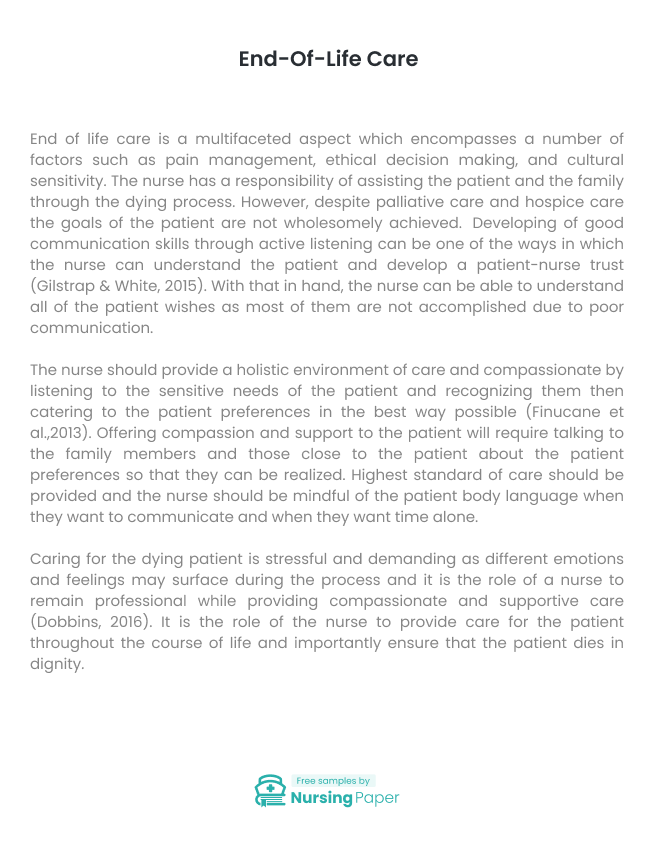
Introduction
End of life care is a multifaceted aspect which encompasses a number of factors such as pain management, ethical decision making, and cultural sensitivity. The nurse has a responsibility of assisting the patient and the family through the dying process. However, despite palliative care and hospice care the goals of the patient are not wholesomely achieved. Developing of good communication skills through active listening can be one of the ways in which the nurse can understand the patient and develop a patient-nurse trust (Gilstrap & White, 2015). With that in hand, the nurse can be able to understand all of the patient wishes as most of them are not accomplished due to poor communication.
The nurse should provide a holistic environment of care and compassionate by listening to the sensitive needs of the patient and recognizing them then catering to the patient preferences in the best way possible (Finucane et al.,2013). Offering compassion and support to the patient will require talking to the family members and those close to the patient about the patient preferences so that they can be realized. Highest standard of care should be provided and the nurse should be mindful of the patient body language when they want to communicate and when they want time alone.


Conclution
Caring for the dying patient is stressful and demanding as different emotions and feelings may surface during the process and it is the role of a nurse to remain professional while providing compassionate and supportive care (Dobbins, 2016). It is the role of the nurse to provide care for the patient throughout the course of life and importantly ensure that the patient dies in dignity.
1. Dobbins, E. H. (2016). Improving end-of-life care: Recommendations from the IOM. The Nurse Practitioner, 41(9), 26-34.
2. Finucane, A. M., Stevenson, B., Moyes, R., Oxenham, D., & Murray, S. A. (2013). Improving end-of-life care in nursing homes: Implementation and evaluation of an intervention to sustain quality of care. Palliative medicine, 27(8), 772-778.
3. Gilstrap, C. M., & White, Z. M. (2015). Interactional communication challenges in end-of-life care: dialectical tensions and management strategies experienced by home hospice nurses. Health communication, 30(6), 525-535.



The download will start shortly.

The download will start shortly.
 Subject:
Medicine
Subject:
Medicine  Number of pages: 4
Number of pages: 4  Subject:
Nursing
Subject:
Nursing  Number of pages: 4
Number of pages: 4  Subject:
Nursing
Subject:
Nursing  Number of pages: 2
Number of pages: 2  Subject:
Health and Social Care
Subject:
Health and Social Care  Number of pages: 2
Number of pages: 2  Subject:
Medicine
Subject:
Medicine  Number of pages: 4
Number of pages: 4  Subject:
Health and Social Care
Subject:
Health and Social Care  Number of pages: 5
Number of pages: 5  Subject:
Health and Social Care
Subject:
Health and Social Care  Number of pages: 3
Number of pages: 3  Subject:
Medicine
Subject:
Medicine  Number of pages: 2
Number of pages: 2  Subject:
Nursing
Subject:
Nursing  Number of pages: 9
Number of pages: 9  Subject:
Medicine
Subject:
Medicine  Number of pages: 7
Number of pages: 7  Subject:
Health and Social Care
Subject:
Health and Social Care  Number of pages: 2
Number of pages: 2  Subject:
Health and Social Care
Subject:
Health and Social Care  Number of pages: 8
Number of pages: 8  Subject:
Nursing
Subject:
Nursing  Number of pages: 10
Number of pages: 10  Subject:
Health and Social Care
Subject:
Health and Social Care  Number of pages: 3
Number of pages: 3  Subject:
Health and Social Care
Subject:
Health and Social Care  Number of pages: 2
Number of pages: 2 
